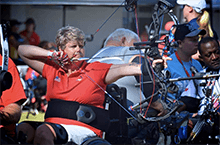From Patient to Paralympian: Army Veteran Lia Coryell Reflects on Journey to Rio
By Brittany Ballenstedt
To see the impossible done, just tell Army veteran Lia Coryell it can’t be. She’ll prove you wrong.
On Sept. 7, 2016, Coryell will roll into the 2016 Paralympic Games in Rio de Janeiro, Brazil, but simply rolling her wheelchair into the archery competition at the 2016 Games will mean she has already accomplished her goal: qualifying for the U.S. team in the W1 class (archers with disabilities that affect their upper and lower body) – a feat no other American woman has accomplished to date.
“No female from the U.S. has ever qualified for the Paralympics in the W1 category, but I knew it could be done,” she says. “I knew it wouldn’t be easy, and I wouldn’t have done it without the support of others.”
For Coryell, the road to the Paralympics has been anything but smooth. The Army Private enlisted in 1983, but just six months into her service as a military truck driver, she broke her leg. Surgery followed, but Coryell went on to discover she would never recover the nerves in her foot. Doctors initially blamed the anesthesia, but four years later, imaging tests revealed nerve damage stemming from Multiple Sclerosis (MS).
Coryell pursued a degree in recreation therapy and went on to work as a recreational therapist for several years. But as she aged, MS relapses came closer and closer together, and at age 45, following another surgery on her knee, she was thrust into living the rest of her life from a wheelchair. Her MS had worsened to a progressive state, and Coryell was ready to give up.
“I thought, ‘I’m in my 40s and not a combat veteran, so what business do I have leading the student veterans?” Coryell said. “But once I learned that we had 1,400 veterans on campus and that their graduation rate was under 10 percent, I knew I had a job to do.”
“I kept asking those veterans why they kept coming back when it was so hard for them,” Coryell says. “And the most common answer was that a fellow soldier in their unit died and didn’t have that opportunity. And I thought, ‘how could I give any less?’”
“I determined that 2016 would be my year; my MS was progressive, and 2020 would be out of question,” Coryell says. “Sam and I withdrew from school and moved to Colorado Springs to train full-time. There was no way I could have trained on my own, so Sam was not only a friend, she was my caregiver the entire time.”
Coryell will compete on the Paralympic stage against the world’s leading archers in the W1 category, the goal, of course, to bring home a gold medal for Team USA.
“My first project was titled, ‘From Combat to the Classroom,” she says. “The crash from combat doesn’t come right away; it often comes six months into a veterans’ education. It’s all interconnected, and it’s our responsibility as veterans and brothers and sisters of each other to start addressing these issues.”
“Adaptive sports save lives, especially in our military culture,” Coryell says. “When people are injured, sick or ill, they lose a part of their identity, and it’s hard to adapt to a new everyday. Adaptive sports helped me get back on the track being part of a culture that was like a brotherhood or sisterhood in the military.”



